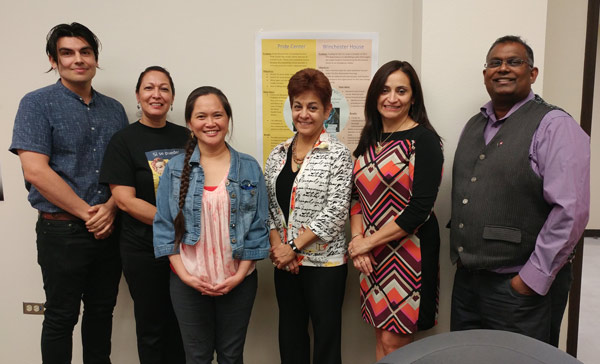Leadership Class Prepares Community Advocates
Last Updated on June 29, 2017 at 12:00 AM
Originally published June 29, 2017
By Laura L. Acosta
UTEP Communications
When the El Pasoans Fighting Hunger Food Bank wanted to find out if there was a need for a food scholarship program for students attending El Paso trade schools, the organization turned to four students in the Master of Education (M.Ed.) in Higher Education program at The University of Texas at El Paso for help.

Maria Chavira, Jason Lauturner, Claudia Ruiz and Susana Ugarte volunteered at the food bank as part of their Leadership and Advocacy Education course in UTEP’s College of Education.
The graduate course enables education and health sciences students to connect with high-needs community organizations like the food bank to research questions or needs that administrators may not have the time or the resources to address.
Students become ethically grounded community advocates for organizations that provide assistance to disadvantaged individuals or groups in the U.S.-Mexico border region, such as at-risk youth, the elderly or immigrants.
“These are organizations that deal with marginalized groups and that are under the public radar,” said Angus Mungal, Ph.D., an assistant professor of Educational Leadership and Foundations who developed the course in 2014. “The hope is that students who wish to give back to the community can have an avenue that allows them to advocate for and help empower their community.”
At the food bank, students were tasked with compiling a list of trade schools in El Paso and contacting their admissions directors. The students also developed a survey to determine if schools were interested in a food scholarship program.
“It was a little eye-opening because as educators and future administrators, we not only want to help our campus but our community as well,” said Chavira, who also planned to collaborate with the food bank to start a food pantry at the elementary school where she teaches. “There are a lot of places around our community that can probably benefit from the food bank.”
The food bank’s Chief Development Officer Terri Wyatt said the research done by Chavira and her classmates saved the organization time and allowed it to test the viability of the program.
“I refer to this type of learning as a living classroom,” Wyatt said. “It is a win-win situation. El Pasoans Fighting Hunger benefits from the research, and the students benefit from working on a project for which they can see results.”
Nine M.Ed. students and two doctoral students took the course during the spring 2017 semester. Aside from the food bank, they worked at Communities in Need, El Paso Human Services, Inc., Las Americas Immigrant Advocacy Center, Border Network for Human Rights, Special Olympics, the H.O.P.E. Institute and Project Combina.
Working at El Paso Human Services, Inc., (EPHSI) helped Ashley McMillan, Bertha Gonzalez and Lionel Garcia better understand the needs of children in foster care who are in their classrooms.
EPHSI provides social services to current and former foster youth in El Paso County.
The group looked at improving the mental health services available at EPHSI. They also worked on a plan to transition EPHSI’s Winchester House, a transitional living center for former foster youth and homeless males between the ages of 18-25, into an emergency shelter.
“I think that as future administrators, this is an opportunity to understand the importance of reaching out to community programs,” Garcia said. “Sometimes you just look within your school organization to solve some problems, but I think it's really important for school administrators to look outside their organizations to find more resources.”
The Leadership and Advocacy Education course is open to graduate students from other disciplines, such as liberal arts, engineering and health sciences, who want to engage and use their skills to help community-based and nongovernmental organizations.
Mungal envisions the course becoming a master’s degree plan that could combine theory with practice to create a stronger foundation in ethics, education and leadership and lead to best practices.
“The master’s course aims to prepare people with skills, giving them an understanding of how organizations function, so they can enter an organization with experience gained from an internship from such organizations,” Mungal said.
Isabel Latz is pursuing a Ph.D. in the Interdisciplinary Health Sciences program in the College of Health Sciences. She was interested in how immigration enforcement regulations impact immigrant communities, health care and other public services.
Latz volunteered at the Border Network for Human Rights to broaden her knowledge about proposed federal and state immigration enforcement measures.
As part of her job, Latz identified and tracked proposed bills with potentially adverse impacts on immigrant communities in the Texas legislature. She researched proposed legislation on the Texas’ anti-sanctuary bill and also helped to develop fact sheets for legislators.
“My background is primarily in research and I thought this might be a good opportunity to get out of the University a little bit and connect with actual people,” Latz said. “I’m also interested in how (immigration enforcement regulations) affect the emotional health, stress and fear of living in communities that are affected by this kind of legislation. So this experience was definitely very useful. I learned about the new proposed legislation and what's happening right now.”
For more information about the Leadership and Advocacy Education course, contact Angus Mungal at asmungal@utep.edu.